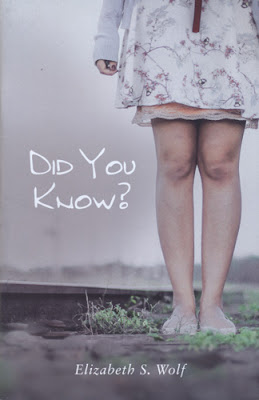Did You Know?
Elizabeth S. Wolf
Studio City, California: Rattle, 2019
ISBN 978-1-931307-40-6
48 pages; $6.00
Review by David P. Miller
Elizabeth S. Wolf’s Did You Know?, a winner of the
2018 Rattle Chapbook Poetry Prize, tells a compelling story of family
destruction and heartening (if incomplete) recovery. There is no sidestepping
the fact that the engine is, yes again, male arrogance and devaluation of
women. I’ll confess to a dilemma: I’d like to say more here than I will. A more
extensive description would mean one spoiler after another.
There are two critical elements braided through this tale of
severe dysfunction/recuperation. The first is the decision by Wolf’s lawyer father,
in 1968, to deliberately conceal the fact that her mother had a degenerative
disease – knowledge concealed from his wife and children, but apparently from
no one else, including the mother’s parents. As she writes: “Believing the
stress of naming the disease / would make it worse, my father chose / to be her
guardian, the gatekeeper / of incoming information. He would tell her / when
the time was right. He was certain / he would know / when the time was right” (“Tangled
Web”). That time, unfortunately, never arrived, as the father suddenly died
eight years later.
The second major element is the exceptional rejection of
Elizabeth, the daughter, by her father and grandfather (also a lawyer). This is
introduced by typically obtuse misogyny: “My father used to say there was
nothing a girl could do / worth paying for. Girl talk was vapid” (“May 4, 1970”).
It manifests in the casting-out of the daughter into a chaos of homelessness
and foster care, beginning here:
My father made vacation plans with
my mother.
He told me, you can do whatever you
want
for the holiday, as long as it
isn’t with us.
I
was 12.
(“The Center Did Not Hold”)
Sadly but unsurprisingly, her mother seems to have
internalized not only a state of helpless dependence on her husband, but also
his disregard for their daughter, who became the subject of a complex family
shunning and bizarre institutional cruelties.
The secret inevitably explodes after the father’s death. This
marks the beginning of Wolf’s re-integration into the family (grandfather
excepted) and the steady remaking of her mother’s new-found autonomy, even as
her body continued to degenerate. Wolf finds new personal strength, and
crucially, a rebuilt and affirmative relationship with her mother. The crux of
it is here:
Now there was an “us”:
the ones who did not know.
And with that I was restored.
(“That Night My Mother Called Me”)
Among stories of the mother’s developing self-image, “There
Used to Be Rules” is one of my favorites. During a visit, Wolf experiences both
astonishment and tenderness at what her mother truly considers an act of
rebellion:
“I used the top sheet from one set
with a different fitted sheet,” she
declared.
“I thought you’d get a kick out of
that.”
I stared at the bed.
I stared at my mother.
But realizing that this is really a threshold moment, the
daughter gives her mother what she needs:
“Wow!” I answered. “I thought I
woke up
extra spunky. Now I know why!”
She turned and crutched down the
hall, giggling.
As subsequent poems show us, Wolf’s mother moves well beyond
this first stage of self-repair to become truly her own woman, even as her
physical condition continues to decline. In “March 2004,” Wolf and her young
daughter visit for the final time: its conclusion is one of the most moving
passages in all of Did You Know?
The nuclear family’s healing (Wolf’s brothers included) does
not, however, mean the rehabilitation of the father’s memory, nor of the
grandfather’s after the latter’s death. The family damage these men did was
their legacy, even as their professional associates held them in warm memory.
“July 1993” begins: “When my grandfather died, / lawyers wept. The family /
held a roast, presided over by his younger daughter, at a hotel / by the
funeral home, / probably on his dime.” And Wolf’s mother was, at last, able to
forgive all those who deceived her, “Except for my father. / He remained dead.”
(“April 2004”)
And that’s enough spoilers for one review: there’s a lot
more to discover in Elizabeth S. Wolf’s Did You Know? Only one concern:
the boilerplate on the title page verso says “While the perceptions and
insights are based on the author’s experience, no reference to any real person
is intended or should be inferred.” Well . . . not true. Fortunately, this
isn’t really part of the book. Was there no other legalese to use instead?



































